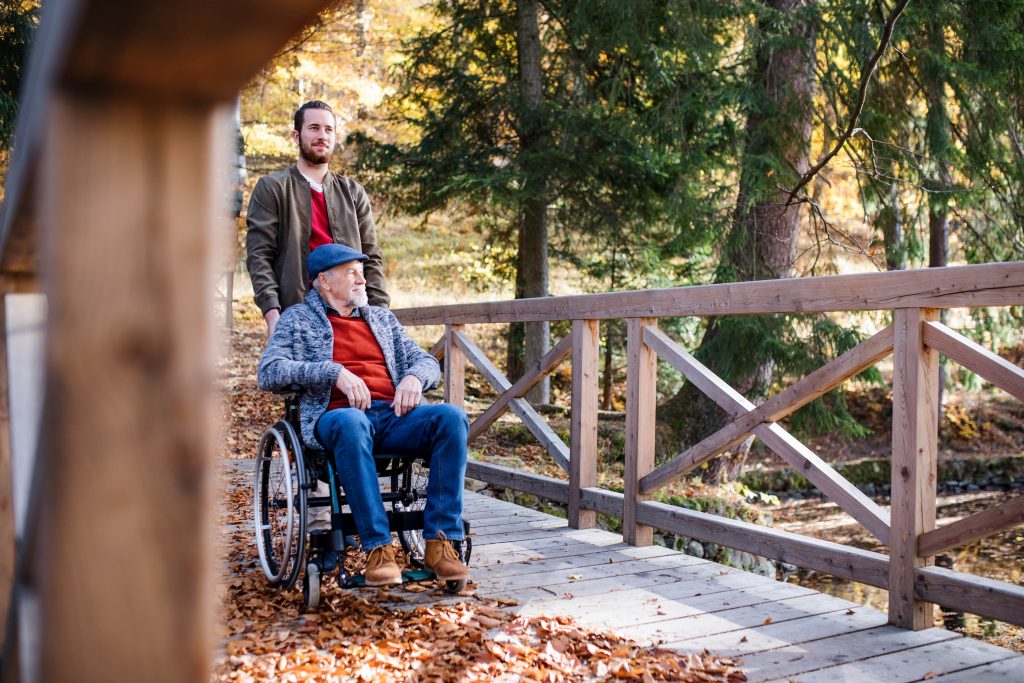Carers – Looking After Your Own Wellbeing
Carers often receive very little recognition for the valuable assistance they provide to loved ones and relatives. Your caring role can be vital for the people you look after. But, spending long hours looking after people with severe disabilities, mental health conditions or mobility issues can take its toll on your wellbeing.
Why do carers need to look after their own health and wellbeing?
Being a carer or personal assistant can be very demanding, hard work, both from a physical and mental perspective. However, one important reason for looking after your own health is that you may not be able to provide care if you are physically unwell. It’s easy to transmit infections and viruses to the person you care for, particularly if they are already fragile due to their own physical health problems.
Caring can also affect your mental health in lots of ways. This may be because the constant demands of your caring role make it difficult to make time for yourself, causing stress levels to build. These circumstances tend to affect unpaid carers more, because employed Carers and Personal Assistants tend to work defined hours. Unpaid carers often care for their loved ones around the clock and don’t always recognise when their own health or mental state starts to fail.

Some common challenges faced by carers include:
• Lack of sleep
• Anxiety
• Depression
• Stress and worries
• Low self-esteem
• Isolation
It’s also quite common for long-term carers to experience feelings of anger, frustration and guilt. And, in worst case scenarios, carers can develop mental health issues that really impact on their ability to provide care and lead an active lifestyle.
Ways to look after your health as a carer
Some of the things you can do to take care of your own wellbeing include:
• Diet – eat and drink regularly and ensure your diet is healthy and well balanced. You can find out more about eating well on the NHS website. This can be easier said than done if you’re working shifts or unsociable hours, but preparation is the key. Investing in some good quality tupperware and dedicating an hour to preparing healthy meals for the week can ensure you’re never caught off-guard and reaching for unhealthy junk food to keep you going.
• Exercise – take regular exercise. This can be beneficial to physical and mental health, as regular exercise can lift endorphin levels in the brain, helping to raise your mood. Exercising regularly also reduces stress levels and helps keep your body supple and heart functioning at the best levels. Again, you can find lots of useful information about exercise to suit your age and circumstances on the NHS website. If you think you won’t have time to fit in any exercise around your caring schedule, why not try to incorporate it into your work? Even just a 30 minute stroll around the park with the person you’re caring for could help.
• Sleep – ensure you get enough sleep. Regular exercise and relaxation activities can help you maintain sleep at the right levels, even if you need to provide care during the night. If your sleep issues are affecting the quality of the care you can offer to your client or loved one, then sources such as your GP or Local Authority could help to offer advice.
• Rest – Arrange regular respite. When you haven’t had a break from your caring responsibilities for a while, the care you provide may be negatively affected. Respite may just mean using your time off during your regular working week to meet up with friends or attend local groups or activities. If you’re an employed carer rather than an unpaid carer, it’s important to use your annual leave in order to give yourself a break.
Alternatively, if you’re an unpaid carer, when your caring responsibilities take up lots of your time and energy, you may want to consider arranging respite for a week or longer to give you chance to take a holiday and get away from it all. the NHS have some great advice about how to arrange alternative care for your loved one, enabling you to have some time off. If you’re eligible, this care may even be funded by your Local Authority, so the financial impact of arranging alternate care doesn’t have to be a worry.

Caring full time
If you’re caring for a family member, you’ll know that becoming a carer isn’t always a role you’ve planned to take on. There are currently around six million carers in the UK, and around half of these individuals combine caring with working on a full or part-time basis. If you’re one of the three million, you’ll know this can place immense stress on the relationships you have with the person you care for. Indeed, it can eventually lead to the build-up of anger or bitterness.
Making the time to care for your own wellbeing is vital for all carers. Your local authority, GP and carer organisations may be able to offer you the essential support, education and time needed to ensure continued good health and mental wellbeing. There are a variety of carer organisations in the UK, with a commitment to helping provide carers with the best possible quality of life. See the Carers UK site for more details.
It’s important not to neglect your own health due to your caring responsibilities, and please don’t hesitate to call for help when you need. You won’t know what local carer groups and activities are available in your own area until you make time to put your own wellbeing as a priority and find out what resources are available to you.

